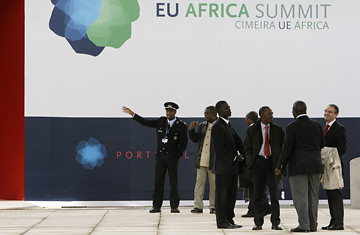
Delegates arrive at Lisbon's International Fair pavillion for the E.U.-Africa summit
European Union gatherings typically achieve little by way of concrete action, and there's no reason to expect this weekend's E.U.-Africa summit in Lisbon to be any different. Despite the high-level summit — only the second of its type — and an agenda that includes such urgent challenges as economic development, climate change and illegal immigration, the issue dominating the headlines has been the invitation to Zimbabwe's strongman President Robert Mugabe. That has prompted British Prime Minister Gordon Brown to boycott the event, arguing that Mugabe should have been grounded at home, where he has reduced his citizens to penury and violated their human rights. Not surprisingly, Mugabe, who delights in berating Britain as the source of his country's historic woes, is unfazed. He arrived in Lisbon Thursday night, where the furor over his presence is likely to keep him in the media spotlight.
The real business on the summit's agenda is far less theatrical. The declaration to be signed by E.U. and African officials this weekend, drafted over months of negotiations, is outlined in a bureaucratic document entitled "The E.U.-Africa Strategic Partnership." It envisages a "political partnership of equals" between the two continents to tackle "common global challenges." European officials have been talking up the document in Brussels, saying it is geared to creating the first truly equitable program between the two continents, rather than historic ties based on Africa's desperate need for aid. "We're moving away from the old-fashioned relationship, where we said: 'Here's the money, here you go, now listen to us," one official at the European Commission in Brussels, who asked to remain anonymous, told TIME on Thursday. "Only that way will we break free of the shackles of the relationship that has existed for decades." In an op-ed piece that ran in newspapers across Africa this week, the commission's president, José Manuel Barroso declared: "The time for lessons, moralizing and paternalism is past."
The open-hearted spirit proclaimed by Barroso and others has collided headlong with hard-boiled negotiations, in which African and European officials have been locked for years. At stake are the tariffs that African countries will pay in order to export their goods to Europe. Europe has long exempted its former colonies from customs duties, but that agreement expires on December 31, and the World Trade Organization has declared that after decades of independence, the former colonies should compete on the global market like anyone else. E.U. officials say they want free-trade deals on condition that Africa opens its markets to European goods. "We're up against a ticking clock," said Peter Power, the E.U.'s trade spokesman in Brussels on Thursday — 25 days before the current free-tariff agreements runs out. "Some countries aren't keen to get down to negotiations."
It's not hard to see why. African countries fear that a new deal could cost them billions, and that their markets will be flooded by produce grown by European farmers who receive huge E.U. subsidies to grow mountains of fruit and vegetables on well-fertilized land. Aid officials say Europe's new deal would be disastrous for some African countries. "It is so ironic: The free trade agreement is going to undermine the very program that the summit is supposed to be promoting," Amy Barry, trade spokeswoman for Oxfam, told TIME before leaving for Lisbon Thursday. "You have warm rhetoric about cooperation, and on the other hand you have what is tantamount to coercion and huge pressure on African governments to sign these trade agreements." South Africa's President Thabo Mbeki said this week he would not sign a new E.U. deal unless the terms improved. African exports to Europe soared between 2000 and 2006, from 85 billion euros ($124 billion) to 126 billion euros ($184 billion), according to E.U. statistics published Thursday. And Europe is increasingly focused on African oil and gas exports; the continent's biggest exporters to the E.U. were energy-rich Algeria and Libya.
But the key player affecting Africa's dealings with Europe won't even be present in Lisbon this weekend — China is rapidly supplanting Europe as the key economic partner for many African countries, as Beijing's rampant appetite for energy and raw materials prompts it to commit billions of dollars to investment in Africa. The Chinese government estimates that its Africa trade could hit $100 billion by 2010. And trade is only part of the picture: China has built roads, power plants and telecommunications towers, and railroads, in exchange for oil. And Beijing has paid little heed to Western political concerns as it cements relationships with leaders shunned by the United States and Europe, such as Mugabe and Sudan's President Omar el-Bashir.
And the Chinese alternative has given African governments far greater clout in trade negotiations with Europe, admit E.U. officials. Still, they say they will not bend their principles. "We will not enter into a competition with China," Amadeu Altafaj, a European Commission spokesman, told TIME on Thursday. "At the end of the day it is up to them to decide who they want ties with. We won't lower our political and human-rights standards." And so, Lisbon will be dominated by symbolic conversations, while the sharp-elbowed trade talks continue behind closed doors at meetings across Europe and Africa.
